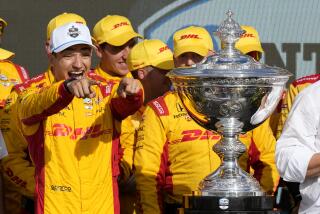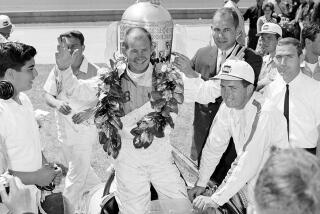Wanted: Competitive Edge
- Share via
CONCORD, N.C. — Pete Wright, 51, is a NASCAR lifer, a mechanic seemingly riveted to stock cars nearly from the time he saw his first race more than 40 years ago. During the next week, Martin Henderson will be reporting his experiences with Wright and the Concord, N.C.-based MB2 Motorsports team as it prepares for the Pop Secret 500 at Fontana on Sept. 5.
*
CONCORD, N.C. -- Pete Wright and seven others are gathered round the U.S. Army car that Joe Nemechek will drive in Saturday night’s NASCAR race at Bristol, Tenn.
They’re running templates -- 32 perfect patterns that define how a Nextel Cup Chevy is supposed to be shaped -- over the car’s smooth metal skin.
There is a minor emergency. A crease is revealed in the driver’s side seat post. It’s ugly, but after a couple of whacks with a hammer it fits.
Still, there’s concern that a NASCAR official will raise a red flag on Friday and require that the team make a further adjustment that could bite into valuable practice time.
“Everything is within 70/1000ths of an inch, and when you’re working with sheet metal you’re talking about some tedious work,” Wright says. “That will be a son-of-a-gun to fix at the racetrack.”
Wright, the team’s lead mechanic, talks to Mark Bieberich, the other co-car chief. They agree that crew chief Ryan Pemberton must be informed.
It’s Pemberton’s call, and he’s in agreement with his two right-hand men: Fix it here.
The misshapen metal reminds Wright of the days long past, when NASCAR was more free-wheeling and less restrictive and a guy like him could make a difference in who won and who didn’t.
Some might call it cheating. “I call it gaining a competitive edge,” Wright says.
Before NASCAR entered the digital age and posted eagle-eyed officials at every corner, cheating, er, gaining a competitive edge, was part of the job.
“Junior Johnson would fire you for not cheating,” Wright says, referring to the NASCAR icon for whom Wright worked in the 1980s.
Years ago, after Buddy Baker complained so much about Cale Yarborough having a weight advantage -- Baker went about 250, Yarborough about 160 -- NASCAR began requiring minimum weights for the race cars.
That opened a door for a creative and willing mechanic.
When he worked for Johnson, Wright says he’d come away from a car after a weigh-in with “so much lead in my pockets ... that my pants would fall down.”
He massaged the rule book in other ways, too, back when the cars were more stock than they are today.
“Usually, for a speedway race, we’d cut an inch on each side of the bumper to make it narrower,” Wright says. “I’ve been known on more than one occasion to send the bumper back and get it re-chromed so you couldn’t tell.”
Among his other tricks: Soaking tires to make the hard compounds softer to increase grip and handling, or using heavier tires that could be replaced after the first pit stop.
“It made you feel like you were getting away with something and helping the team,” Wright says. “It made for some good racing. It made for some very interesting racing.”
NASCAR’s crackdown has limited the cheating ways of the past, although there are still weekly infractions for unapproved parts.
“If there’s a crew chief who is doing it and getting away with it, they’ve got a good game plan,” Wright says.
He’s sure some are still tempted.
“I know there are crew chiefs out there who lay awake thinking about how they can get away with a certain thing ... to get that little bit to get over the hump to get that win or get that top five,” Wright says.
“Everybody’s tempted. When NASCAR really started getting people’s attention was two or three years ago, when they started upping the fines and taking points away.
“If you try to win a race because of a quarter-inch here and a quarter-inch there, it may end up costing you a quarter-million dollars in the championship.”
Wright may miss the old days, but that doesn’t mean he prefers them.
“I also like the way it is now, because it’s to the point where it brings more of the team effort into it, as far as pit stops, things like that,” he says. “Time slowly takes care of everything.”
More to Read
Go beyond the scoreboard
Get the latest on L.A.'s teams in the daily Sports Report newsletter.
You may occasionally receive promotional content from the Los Angeles Times.










